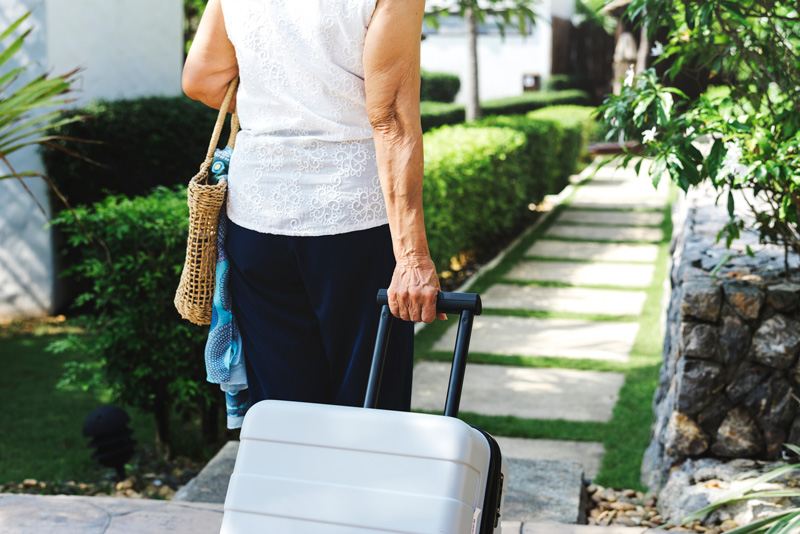10 Safety Tips for Traveling Smart
I love to travel. For me, there’s nothing better than packing a bag, tossing it in the car and heading down the road. Destination? Doesn’t matter. In August of ’78, I was an intern for my congressman in Washington, D.C. I packed my bags, leaving before dawn on the 29th of July. On the morning of the 31st, ready and eager to start work the next day, I arrived in D.C. After breakfast, I found my congressman’s office, introduced myself to the office manager and in the same breath told her I had no place to stay. True story. The planning gene was not yet a part of my DNA. It had to be implanted.
Over the years, I have learned to make reservations ahead of time and plan my trip, making it as worry-free as possible. It could be a sign of growing older or even one of maturity. Either way, I like hassle-free traveling. I’m sure most of you do too. The best trip is one without surprises. Though older, seniors still like to travel. Planning and preparation is now the name of the game, especially if you’re traveling abroad. The carefree days of youth are a thing of the past. Today I’m going to share with you ten tips to help you stay safe on your next out of town adventure.
- Plan Ahead– (you knew this was coming). Research your destination and plan accordingly. Pack for the climate. Have all your necessary paperwork prepared ahead of time. Get all your shots. Prepare. Prepare. Prepare.
- Stop mail and papers– You don’t want your newspapers and mail piling up on your front porch. It’s an open invitation for unwanted visitors. Call the post office and the newspapers and put a hold on their delivery.
- Tell a friend, neighbor or relative– Give someone you trust a copy of your itinerary so they can keep tabs on your progress. Ask them to go by your house to make sure the mail and paper have been stopped. If you think like me of worst-case scenarios, you may want to leave a copy of your will with someone.
- Call Your Credit Card Company– Be sure to let them know you are leaving town and where you are going. You don’t want to be stranded with little or no cash and unable to use your card. A few months ago, this happened to me on a weekend trip. I went to put gas in my car, but the card was denied. Luckily, I had some cash and a debit card. The credit card had been placed on hold. I was less than 200 miles from home. Imagine if I had been out of the country.
- Check Your Insurance– In case of an emergency, be it medical or something else, make sure you are covered. You may not need to buy a new travel policy, just add to what you already have. This could be “essential for older travelers who are more at risk of falling and hurting themselves, getting sick, or needing extra medication if their travel is interrupted or delayed”.
- Be Cautious– Hotels are meant to be safe, but that isn’t always the case. One recommendation is when you leave your room, don’t put out the “clean room” door hanger. The sign is an open invitation for thieves to steal money, jewelry or your passport. When in your room, be sure the safety lock is used. If you do have valuables, use the room safe. Also, ask for a room close to an elevator, more traffic deters thieves. Don’t get a first-floor room, thieves can get in through the window.
- Watch What You Eat– Older adults often have delicate stomachs, especially if eating a new or exotic dish. It may be best to avoid too many heavy, spicy or cheesy food items. Furthermore, if you’re on any medication check first with your doctor and be sure it won’t interact negatively with any foods you might wish to eat.
- Guard Your Medication– Be sure to pack enough for the whole trip, and don’t pack it in checked luggage. Have enough for an extra day or two in case your return is delayed. Also, take a list of your medications as well as their generic counterparts. If traveling abroad, find out the medication’s name in the language of the destination you’re traveling to.
- Don’t Travel Alone– Older adults are often a target. Best to travel in a group. If you’re not part of a tour, you may want to invite family or friends to travel with you.
- Have Happy Feet– Be sure to pack comfortable shoes. There’s nothing worse than sore feet on a trip you’ve been looking forward to and now can’t enjoy. Women may be advised to not wear heels. If you plan on walking a great deal, you could hurt an ankle. Best to wear flats. That doesn’t mean ugly, just comfortable.
This is a good place to stop for now. As usual, the above recommendations are not exhaustive. There are numerous other ideas. For example, don’t carry a lot of cash and don’t always wear expensive jewelry. These are just a few “travel smarts” to help you enjoy a safe trip wherever you go. Happy travels.


Recent Comments